See also
- LGBT rights in Australia
- List of LGBT rights organizations
- National Center for Lesbian Rights - national lesbian rights organization in the United States
- LGB Alliance Australia
- Women's Forum Australia
The Coalition of Activist Lesbians Australia (CoAL) is an advocacy group established in 1994 [1] to combat discrimination against lesbians, and the first lesbian non-government organisation to gain accreditation from the United Nations. [2] [3] [4] [5]
COAL lobbies the Australian Commonwealth and other state and territory Governments to remove discrimination against lesbians. COAL lobbied at the UN 4th World Conference on Women, Beijing, 1995, and co-hosted the first international lesbian-space tent at the 1995 NGO Forum. Among a number of other organisations, COAL successfully lobbied for the Australian Government to sign the Optional Protocol to the Convention for the Elimination of All Forms of Discrimination Against Women (CEDAW). [6] They are Australia's national lesbian advocacy organisation and the only United Nations accredited lesbian non-government organisation. [7]

Lesbian, gay, bisexual, transgender and queer (LGBTQ) movements are social movements that advocate for LGBTQ people in society. Although there is not a primary or an overarching central organization that represents all LGBTQ people and their interests, numerous LGBT rights organizations are active worldwide. The first organization to promote LGBT rights was the Scientific-Humanitarian Committee, founded in 1897 in Berlin.
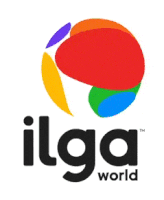
The International Lesbian, Gay, Bisexual, Trans and Intersex Association (ILGA) is a LGBTQ+ rights organization.
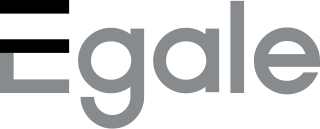
Egale Canada is a Canadian charity founded in 1986 by Les McAfee to advance equality for Canadian lesbian, gay, bisexual and transgender (LGBTQ) people and their families, across Canada.
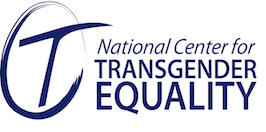
The National Center for Transgender Equality (NCTE) is a nonprofit social equality organization founded in 2003 by transgender activist Mara Keisling in Washington, D.C. The organization works primarily in the areas of policy advocacy and media activism with the aim of advancing the equality of transgender people in the United States. Among other transgender-related issue areas, NCTE focuses on discrimination in employment, access to public accommodations, fair housing, identity documents, hate crimes and violence, criminal justice reform, federal research surveys and the Census, and health care access.

ILGA-Europe is the European region of the International Lesbian, Gay, Bisexual, Trans and Intersex Association. It is an advocacy group promoting the interests of lesbian, gay, bisexual, trans and intersex (LGBTI) people, at the European level. Its membership comprises more than 500 organisations from throughout Europe and Central Asia. The association enjoys consultative status at the United Nations Economic and Social Council and participatory status at the Council of Europe.
The origin of the LGBT student movement can be linked to other activist movements from the mid-20th century in the United States. The Civil Rights Movement and Second-wave feminist movement were working towards equal rights for other minority groups in the United States. Though the student movement began a few years before the Stonewall riots, the riots helped to spur the student movement to take more action in the US. Despite this, the overall view of these gay liberation student organizations received minimal attention from contemporary LGBT historians. This oversight stems from the idea that the organizations were founded with haste as a result of the riots. Others historians argue that this group gives too much credit to groups that disagree with some of the basic principles of activist LGBT organizations.
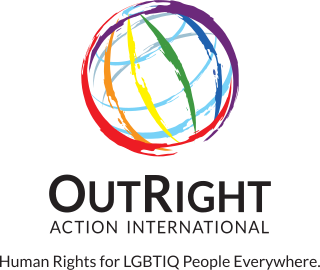
OutRight International (OutRight) is an LGBTIQ human rights non-governmental organization that addresses human rights violations and abuses against lesbian, gay, bisexual, transgender and intersex people. OutRight International documents human rights discrimination and abuses based on their sexual orientation, gender identity, gender expression and sex characteristics in partnership with activists, advocates, media, NGOs and allies on a local, regional, national and international level. OutRight International holds consultative status with ECOSOC.

Lesbian, gay, bisexual and transgender (LGBT) individuals in the Republic of the Philippines have faced many difficulties in their homeland, such as prejudice, violence, abuse, assault, harassment and other forms of anti-LGBT rhetoric. Many LGBT Filipinos are met with mixed attitudes and reactions by their families, friends and others in their communities, as well as professionals, educators, their national public officials, politicians, attorneys and others working for the government and the rest of the general population.

Lesbian, gay, bisexual, and transgender (LGBT) people in Malaysia face severe challenges not experienced by non-LGBT residents. Sodomy is a crime in the country, with laws enforced arbitrarily. Extrajudicial murders of LGBT people have also occurred in the country. There are no Malaysian laws that protect the LGBT community against discrimination and hate crimes. As such, the LGBT demographic in the country are hard to ascertain due to widespread fears from being ostracised and prosecuted, including violence.

LGBT movements in the United States comprise an interwoven history of lesbian, gay, bisexual, transgender and allied social movements in the United States of America, beginning in the early 20th century. A commonly stated goal among these movements is social equality for LGBT people. Some have also focused on building LGBT communities or worked towards liberation for the broader society from biphobia, homophobia, and transphobia. LGBT movements organized today are made up of a wide range of political activism and cultural activity, including lobbying, street marches, social groups, media, art, and research. Sociologist Mary Bernstein writes: "For the lesbian and gay movement, then, cultural goals include challenging dominant constructions of masculinity and femininity, homophobia, and the primacy of the gendered heterosexual nuclear family (heteronormativity). Political goals include changing laws and policies in order to gain new rights, benefits, and protections from harm." Bernstein emphasizes that activists seek both types of goals in both the civil and political spheres.

Lesbian, gay, bisexual, and transgender (LGBT) people in Zambia face significant challenges not experienced by non-LGBTQ residents. Same-sex sexual activity is illegal for both men and women in Zambia. Formerly a colony of the British Empire, Zambia inherited the laws and legal system of its colonial occupiers upon independence in 1964. Laws concerning homosexuality have largely remained unchanged since then, and homosexuality is covered by sodomy laws that also proscribe bestiality. Social attitudes toward LGBT people are mostly negative and coloured by perceptions that homosexuality is immoral and a form of insanity. However, in recent years, younger generations are beginning to show positive and open minded attitudes towards their LGBT peers.

Discussions of LGBT rights at the United Nations have included resolutions and joint statements in the United Nations General Assembly and the United Nations Human Rights Council (UNHRC), attention to the expert-led human rights mechanisms, as well as by the UN Agencies.
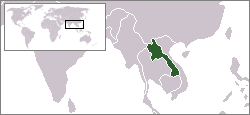
Lesbian, gay, bisexual and transgender (LGBT) rights in Laos go unreported and unnoticed. While homosexuality is legal in Laos, it is very difficult to assess the current state of acceptance and violence that LGBTQ people face because of government interference. Numerous claims have suggested that Laos is one of the most tolerant communist states. Despite such claims, discrimination still exists. Laos provides no anti-discrimination protections for LGBT people, nor does it prohibit hate crimes based on sexual orientation and gender identity. Households headed by same-sex couples are not eligible for any of the rights that opposite-sex married couples enjoy, as neither same-sex marriage nor civil unions are legal.

Lesbian, gay, bisexual, and transgender (LGBT) people in Mongolia face legal and social challenges not experienced by non-LGBT people, though there have been substantial improvements since the 1990s. Homosexuality was criminalised in Mongolia in 1961 through its Criminal Code. Following the Mongolian Revolution of 1990 and the peaceful transition to a democracy, homosexuality was legalised and awareness about LGBT people has become more prevalent. Hate crimes on the basis of sexual orientation and gender identity result in additional legal penalties. Hate speech based on these two categories has been outlawed in the country since 1 July 2017. Households headed by same-sex couples are, however, not eligible for the same legal protections available to opposite-sex couples.
The Norwegian Women's Lobby is a feminist policy and advocacy organization in Norway and works for "the human rights of girls and women in all their diversity, to eliminate all forms of discrimination against all girls and women and to promote a gender equal society." It is described as the country's "main, national, umbrella organization" for women's rights. NWL understands women's human rights and discrimination in an intersectional perspective and works to represent the interests of all those who identify as women and girls. NWL is funded by the government over the national budget. The mission of the organization is to eliminate all forms of discrimination against women and girls on the basis of the Convention on the Elimination of All Forms of Discrimination Against Women, the Beijing Platform for Action and other fundamental international agreements relating to women's human rights. It works to integrate women's perspectives into all political, economical and social processes.
galck+, formerly The Gay and Lesbian Coalition of Kenya (GALCK), is the national Sexual Orientation Gender Identity and Expression (SOGIE) umbrella body, representing LGBTQ+ voices across Kenya.
This is a timeline of notable events in the history of non-heterosexual conforming people of African ancestry, who may identify as LGBTIQGNC, men who have sex with men, or related culturally specific identities. This timeline includes events both in Africa, the Americas and Europe and in the global African diaspora, as the histories are very deeply linked.